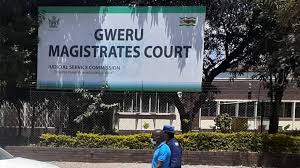Dead man testifies in Gweru High Court murder trial
By Dumisani Ndlovu
Gweru, Zimbabwe – The Gweru High Court recently witnessed a trial so extraordinary it has ignited a community debate about the intersection of traditional beliefs and modern justice.
Four individuals, Luckson Dube, Tafara Mafirachuma, Wedzerai Moyo, and Cecilia Shoko, accused of the murder of Nyasha Moyo, were acquitted due to the court’s lack of jurisdiction over what Judge Bongani Ndlovu deemed to be matters of the spirit. The acquittal came despite compelling, if unconventional, testimony that included a minor seemingly channeling the deceased and a swarm of locusts invading the courtroom.
The unsettling drama began as the accused entered the courtroom. This reporter who was following proceedings from the court gallery witnessed large locusts descending the court, their wings beating in unison as they circled the room. The sight caused a stir, with many interpreting the insects as an omen tied to the ongoing trial.
The courtroom was still reeling from the shock when another locust flew in and landed on a news reporter’s pen. In a frantic bid to dislodge the unwelcome visitor, the reporter swung his pen wildly, sending the locust tumbling to the floor. Tragically, the locust was promptly crushed to death by a panicked onlooker, a law student who had been also observing the proceedings from the gallery.
The most dramatic moment unfolded when a 15-year-old witness took the stand. Eerily calm, the minor delivered a chilling account of Nyasha Moyo’s murder, claiming to be possessed by the deceased’s spirit. He detailed how the accused had lured Moyo to a party before brutally attacking him with iron rods and running him over with a car, twice.
“I was invited to a party, and then they attacked me with iron rods,” the minor testified in a low, monotone voice. “They ran me over with a car, twice. I felt my life slipping away.” Adding to the strangeness, the teenage witness was only six years old at the time of the alleged murder, raising further questions about the origin of his detailed testimony.
The courtroom was transfixed. The minor’s graphic testimony, coupled with the unnerving presence of the locusts, led many to believe that the spirit of Nyasha Moyo had indeed taken possession of the young boy to seek justice from beyond the grave.
Further corroborating the timeline of events was Egina Chigwida, a resident of Office Village, Chief Mazvihwa, Mukwakwe, Zvishavane. Chigwida, employed at Support Unit Buchwa Funeral Fund Bottle Store at Makwakwe Business Centre, testified that on a night in October 2016, between 11 PM and 12:01 AM, she was awakened by a vehicle hooter and knocking at the bar. She identified the accused, along with the deceased and another individual identified as Chirongoma, a teacher at Zvomukonde Secondary Schiool, Mberengwa requesting to open the bar.
She complied, and the group, using a white vehicle, consumed alcohol and played snooker. Chigwida recounted how, after breaking a bottle, she asked them to leave. As they exited, she witnessed an argument between the first accused and Nyasha Moyo regarding entry into the car. While Moyo eventually entered the vehicle and they drove off, they soon stopped, and Chigwida witnessed further shoving and shouting. The following morning, she learned that Moyo had been found dead on the roadside.
The acquittal of all the accused persons by Judge Justice Ndlovu, despite the compelling, albeit unconventional, testimony, sparked considerable debate, with legal experts arguing that the circumstantial evidence presented should have been sufficient for a conviction.
The case has also reignited the conversation across the province about the role of traditional beliefs in the modern legal system, particularly the concept of “kuripa ngozi” or Ukubhadal’ingozi in Ndebele (appeasing the deceased spirit). This Shona tradition emphasizes conflict resolution and justice-seeking through compensation from the offender’s family to the victim’s family, based on the belief that a restless spirit can torment the alleged murderer and their family until appeased.
The Nyasha Moyo case joins a list of high-profile incidents involving “kuripa ngozi” in recent years. In 2011, the son of former Midlands Governor Jaison Machaya was ordered to pay significant compensation for the death of Moses Chokuda after the deceased’s family refused to bury the body for over two years, citing unexplained experiences they attributed to the deceased’s vengeful spirit. A similar situation occurred in 2012, when a Gokwe family refused to bury their son for six months, demanding a confession from the alleged murderers.
These cases underscore the ongoing tension between traditional beliefs and modern legal frameworks in Zimbabwe. While the court has acquitted the accused in the Nyasha Moyo case, many believe that justice has not been served. The traditional saying, “one cannot spill blood and get away with it,” resonates strongly in the aftermath of this bizarre and unsettling trial.
As the courtroom empties, the spirit of Nyasha Moyo remains a palpable presence, a disturbing reminder of the brutal crime and the unresolved search for justice. The case leaves unanswered questions about how to reconcile deeply held traditional beliefs with the laws of the modern world.


